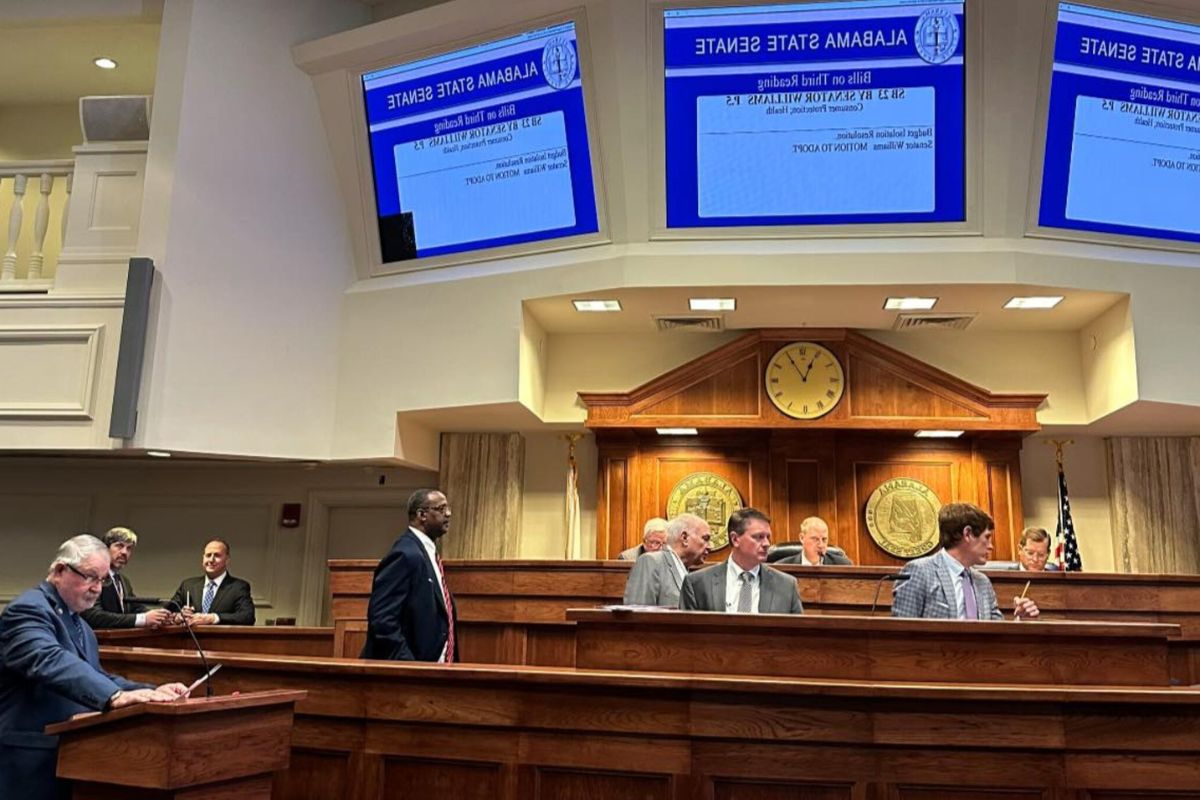Alabama Bans Cultivated Meat: Alabama’s recent ban on cultivated meat has sent shockwaves through the agricultural and technological sectors, sparking a heated debate that is set to define the upcoming election year in the state.
With Senator Williams leading the charge against this emerging industry, questions arise about the implications for innovation and consumer choice.
As industry players and global observers weigh in on the decision, the political landscape in Alabama braces for what promises to be a dramatic showdown between tradition and progress.
The stakes are high, and the outcome of this clash is poised to shape not only the future of cultivated meat but also the direction of policy-making in the state.
Key Takeaways
- Alabama Senate passed SB23 banning cultivated meat, sparking debate.
- Industry faces innovation stifling, economic impact, and sustainability concerns.
- Senator Williams supports ban, emphasizing tradition and agricultural identity.
- Cultivated meat ban sets stage for broader political battles over food production.
Alabama Senate Takes Aim at Cultivated Meat: A Legislative Clash in Election Year
In the midst of the heightened political landscape during the US election year, the Alabama Senate has ignited a legislative clash by passing a bill aimed at banning cultivated meat. This bold move, spearheaded by Senator Jack Williams through SB23, has thrust Alabama into the center of a heated debate regarding the future of food production and the emerging alternative protein industry. The decision to outlaw cultivated meat raises critical questions about innovation, sustainability, and consumer choice.
Advocates of the bill argue that traditional livestock farming practices are deeply ingrained in Alabama’s culture and economy, warranting protection from potential disruption posed by lab-grown alternatives. They emphasize the importance of preserving the state’s agricultural heritage and safeguarding local farmers’ livelihoods. On the other hand, opponents view the ban as a regressive step that stifles technological progress and limits access to more sustainable and ethical food sources.
As the ban on cultivated meat takes effect, the clash between tradition and innovation in Alabama’s agricultural sector is poised to intensify, setting the stage for a broader conversation on the intersection of politics, technology, and food production.

READ MORE: Senate Approves Ban on Lab-Grown Meat
Legislative Stand Against Cultivated Meat:
Amidst the growing controversy surrounding cultivated meat, Alabama’s recent legislative decision to criminalize its production and distribution marks a pivotal moment in the state’s stance on alternative protein sources. The move to ban cultivated meat reflects a broader societal struggle between traditional agricultural practices and emerging technologies.
- Innovation Suppression: By outlawing cultivated meat, Alabama risks stifling innovation in the food industry and limiting consumer choice. This legislative stance may deter investment in alternative protein sources, hindering progress towards more sustainable and ethical food production methods.
- Economic Implications: The ban on cultivated meat could have significant economic repercussions, impacting businesses involved in the development and distribution of lab-grown proteins. It may also hinder job creation and technological advancements in the state.
- Public Health and Environmental Concerns: Proponents of cultivated meat argue that it offers a more environmentally friendly and potentially safer alternative to traditional animal agriculture. By criminalizing its production, Alabama may be disregarding potential benefits for public health and the planet.
Senator Williams’ Perspective:
Alabama’s decision to criminalize the production and distribution of cultivated meat has garnered strong support from Senator Jack Williams, a prominent advocate for traditional agricultural practices in the state. As a cattle farmer himself, Williams champions the bill, emphasizing concerns about safety, transparency, and the state’s existing agricultural abundance.
Despite safety approvals from the USDA and FDA, Williams staunchly argues against the introduction of cultivated meat in Alabama. He echoes sentiments shared by fellow lawmakers who fear the potential disruption this new technology could bring to the state’s long-standing agricultural traditions. Williams’ perspective reflects a deep-seated commitment to preserving the integrity of Alabama’s agricultural sector, rooted in a belief that traditional methods are not only safe but also crucial for maintaining the state’s agricultural identity.
His stance highlights the ongoing debate between embracing innovation and safeguarding age-old practices, a tension that continues to shape the future of Alabama’s agricultural landscape.
Industry Responses and Global Trends
The resistance from Californian cultivated meat companies against Alabama’s ban highlights a growing global divide in the meat industry regarding the acceptance and regulation of alternative protein sources. While Alabama’s stance reflects a trend in the US towards restricting cultivated meat, the response from companies like UPSIDE Foods and Eat JUST underscores broader industry dynamics and global implications.
- Innovation vs. Tradition: Cultivated meat represents a shift towards sustainability and animal welfare, challenging traditional meat production practices.
- Market Competition: The ban in Alabama raises concerns about fair market competition and the potential stifling of technological advancements in the meat industry.
- Global Demand: With the world facing increasing challenges to meet meat demand sustainably, the pushback against cultivated meat regulation could hinder progress towards a more efficient and ethical food system.
The clash between state regulations and industry innovation sets the stage for a broader conversation on the future of food production and the role of alternative protein sources in meeting global needs.
Political Landscape and Future Battles
The intersection of political agendas and innovative food technologies heralds a battleground where traditional ideologies clash with the evolution of the meat industry. Alabama’s recent ban on cultivated meat sets the stage for a broader political landscape filled with challenges and opportunities. States like Florida, Texas, Nebraska, and Arizona are also grappling with bills aimed at regulating alternative protein sources, reflecting a growing trend across the nation. As the clash between traditional livestock sectors and cutting-edge food solutions intensifies, the upcoming election year adds a layer of complexity to the debate.
The future battles in the realm of food technology will not only shape the way we produce and consume meat but also influence larger discussions around sustainability, animal welfare, and economic interests. Political actors, from lawmakers to industry stakeholders, are positioning themselves in this arena, each vying for a voice in shaping the future of the meat industry. As the drama unfolds, it is clear that the road ahead will be fraught with contention, compromise, and the need for innovative solutions to bridge the gap between tradition and progress.

Conclusion Of Alabama Bans Cultivated Meat
The recent ban on cultivated meat in Alabama reflects a larger trend of legislative resistance to emerging food technologies. As the industry continues to grow and evolve, it is clear that political battles will shape its future trajectory.
The clash between lawmakers and industry stakeholders highlights the complex interplay between regulation, innovation, and public perception. This decision sets the stage for further debates and challenges in the realm of alternative protein production.

